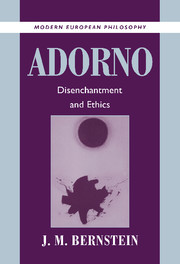Book contents
- Frontmatter
- Contents
- Preface
- List of Abbreviations
- Introduction
- 1 “Wrong Life Cannot Be Lived Rightly”
- 2 Disenchantment: The Skepticism of Enlightened Reason
- 3 The Instrumentality of Moral Reason
- 4 Mastered by Nature: Abstraction, Independence, and the Simple Concept
- 5 Interlude: Three Versions of Modernity
- 6 Disenchanting Identity: The Complex Concept
- 7 Toward an Ethic of Nonidentity
- 8 “After Auschwitz”
- 9 Ethical Modernism
- Index
7 - Toward an Ethic of Nonidentity
Published online by Cambridge University Press: 05 June 2012
- Frontmatter
- Contents
- Preface
- List of Abbreviations
- Introduction
- 1 “Wrong Life Cannot Be Lived Rightly”
- 2 Disenchantment: The Skepticism of Enlightened Reason
- 3 The Instrumentality of Moral Reason
- 4 Mastered by Nature: Abstraction, Independence, and the Simple Concept
- 5 Interlude: Three Versions of Modernity
- 6 Disenchanting Identity: The Complex Concept
- 7 Toward an Ethic of Nonidentity
- 8 “After Auschwitz”
- 9 Ethical Modernism
- Index
Summary
Introduction
Disenchantment as procedural demythologization is sceptical and irrational because it operates with an illegitimate, partial concept of the concept; disenchantment is sceptical and destructive because the logic of the simple concept destroys the very structures through which human cognition becomes sensitive to those features of experience that bear on human happiness and misery as internally correlated with the possibilities of human action. By seeking to eliminate the materiality and dependency of the concept, the reflective mechanisms of the simple concept tendentially disintegrate an independent ethical world. Conversely, the trajectory of Adorno's argument is to show how, if matters are understood from the perspective of the complex concept, then the logical moments comprising moral insight become instantiated in the world not through the taking up of a special moral point of view or as a special domain of practice within a complex world, but as somehow constitutive of the conceptual binding of the self to the world iiberhaupt. Put another way, if Adorno's conception of the complex concept is anywhere near correct, then there is no original distinction between practical and theoretical reason to be drawn, even if specific practices of reasoning develop which elaborate, extend, clarify, and rationalize different portions or aspects of or perspectives on ordinary experience.
- Type
- Chapter
- Information
- AdornoDisenchantment and Ethics, pp. 330 - 370Publisher: Cambridge University PressPrint publication year: 2001



